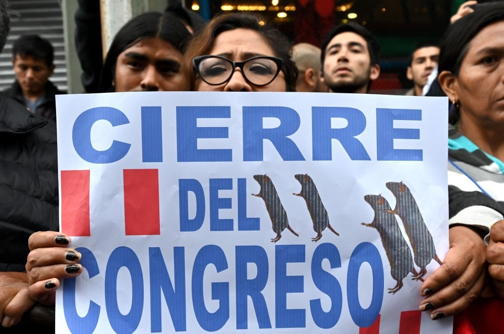
(above) Credit: CRIS BOURONCLE/AFP via Getty
Five Things to Know About Peru’s Jan. 26 Election
January 13, 2020 - Original article: Americas Quarterly
The coming vote offers a big opportunity for Peru’s anti-corruption fight, and could set the stage for presidential elections next year.
BY Simeon Tegel
LIMA – Peruvians will elect a new Congress on Jan. 26 after President Martín Vizcarra’s momentous decision last September to dissolve the previous legislature for resisting his anti-corruption agenda. The coming elections have the potential to channel public fury over a series of recent graft scandals, including the Odebrecht case, and pave the way for watershed political and judicial reforms aimed at cleaning up public life.
But throwing unpopular politicians out of office may prove easier than finding worthy replacements. More than 80% of Peruvians applauded Vizcarra’s dissolution of Congress, which may have served as escape valve to preempt the kinds of mass protests that have rocked other countries in the region. But polls now show widespread apathy over the vote, raising the possibility that Peruvians could miss a historic opportunity for change. Here, AQ takes a look at five key factors at play ahead of the election.
An unenthusiastic public
A total of 21 parties are running in the elections, with none consistently receiving double-digit support from voters. The Fujimorista Fuerza Popular party, which dominated the last Congress, seems certain to return, albeit in greatly reduced numbers. Meanwhile the APRA party of former President Alan García, who killed himself last year as he was being arrested for allegedly taking bribes, faces losing its registration.
Polls suggest spoiling the ballot may be by far the most popular option, with around one in three voters planning to do so. But under Peru’s electoral system, that could lead to a splintered Congress with no working majority and little public support. Broadly speaking, parties need to take a minimum of 5% of the popular vote to gain representation in the legislature, but the more voters spoil their ballots or leave them blank, the lower that 5% threshold will be set.
“There is a risk of a vicious circle, of radical or corrupt politicians creating more public disaffection, which in turn leads to more people spoiling their ballots,” warned Arturo Maldonado, a political scientist at the Pontifical Catholic University of Peru.
Centrist majority?
The rock-bottom voting intentions for most parties and the high numbers of undecided voters makes the election results highly unpredictable. That uncertainty has increased further thanks to the high proportion of new candidates, potentially ushering in a generational change in Peruvian politics. Nevertheless, there is also a consensus among experts that moderates will likely dominate the new Congress.
That does not necessarily mean the next legislature will be amenable to Vizcarra’s agenda. The party currently leading the polls (albeit by a tiny margin) is Acción Popular (AP), once the home of the late centrist 1980s President Fernando Belaúnde Terry. Yet in the last legislature, AP’s lawmakers divided into two rival factions, one that frequently voted with the Fujimoristas and another that bitterly opposed them. An interesting new player is the Partido Morado, founded by Julio Guzmán, a technocrat with a University of Maryland Ph.D. in public policy who was controversially ruled out of the 2016 presidential race on a technicality. Partido Morado could prove the party-less Vizcarra’s best friend in the new Congress.
Vizcarra’s standing
The last, lingering doubts about the legitimacy of Vizcarra’s dissolution of Congress appear to have been swept aside, with the Constitutional Court expected to narrowly vote against a legal challenge from the former head of the dissolved body this week. Despite the landmark nature of the president’s move and his embrace of the long overdue anti-corruption agenda, many still view Vizcarra as a transitional leader.
Yet if the new Congress does greenlight his reforms, Vizcarra could go down as one of Peru’s most consequential and popular elected leaders in recent history. That said, the bar could hardly be lower, given that his predecessors include one former president serving a 25-year jail term for corruption and human rights abuses, and four others allegedly caught up in the Odebrecht scandal.
The prospects for reform
The new Congress will be in office for just 18 months, but if it runs with Vizcarra’s reforms, it could have outsized impact on Peruvian politics in the future. Measures to look out for include: curbing the parliamentary immunity that has frequently allowed lawmakers to get away with flagrant crimes; a restoration of a senate, which could check the worst excesses of the current single-chamber legislature; and public funding of political parties to stop the epidemic of illicit donations, often from big business and in some cases organized crime.
Setting the stage for 2021
If the new Congress is popular with the public, it could help Peru avoid the emergence of an anti-establishment dark horse presidential candidate in 2021. The list of moderate candidates for the presidency will likely include Vizcarra’s former Prime Minister Salvador del Solar, who forced his way into Congress to propose the vote of confidence in the Cabinet that led to the dissolution.
“Del Solar would be a very attractive candidate if he decides to run,” Alfredo Torres, head of pollsters Ipsos Perú, told AQ. “He is a very good communicator.”
Another possible candidate is George Forsyth, the young former goalkeeper of Peru’s national soccer team and son of a former ambassador to the U.S. who is currently making waves as the mayor of La Victoria, a large blue-collar district in central Lima.
“(Forsyth) has an interesting profile as a young centrist with a reputation for efficiency and integrity,” said Torres.
The Partido Morado’s Guzmán is also likely to run, though it remains to be seen whether his personal appeal can match that of his party, especially outside the urban middle class.
--
Tegel is an independent journalist and analyst based in Lima. You can follow him on Twitter at @SimeonTegel.